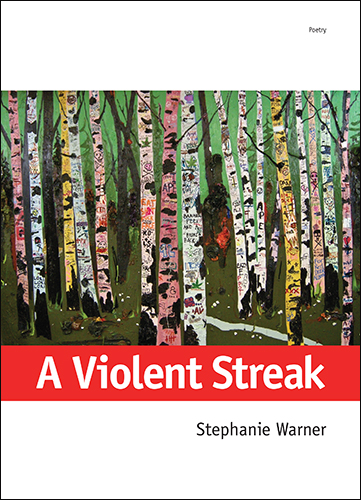
A Violent Streak
Stephanie Warner
Fitzhenry & Whiteside Ltd., 2018
Review by Mormei Zanke
Stephanie Warner’s debut poetry collection A Violent Streak begins with a question: “Or is it a seam?” (15). Warner doesn’t waste any time, entreating the reader to participate in her conversation—one that seems to begin in the middle of a greater dialogue the writer has been having with herself, off the pages of this book. A Violent Streak gives the impression of being a slice of the universe, with Warner acting as anthropologist, documenting human nature for historical record.
In this collection, forty poems coalesce to form a portrait of the increasingly strange world we find ourselves in. Warner juxtaposes disparate elements such as creation and destruction, industry and nature, and the physical and abstract. This results in uncanny coexistences that feel familiar, yet absurd. The title poem introduces this concept:
“The flare stacks never leave their minds; the prayer-like rise and fall
of oil wells, or the sunsets, the colours all wrong, through a shimmered film
of pollution. Happy hour (it’s always happy hour) and nightly wet t-shirt contests
in bars plucked from Felix the Cat’s carpet bag. Formica and movie prop furnishings
heaped like kindling.” (15)
This passage describes a specific experience of working on the northern Albertan oil sands as pocketed isolation from the rest of the world. However, Warner draws upon ideas readers are familiar with—prayer, sunsets, Formica, and places them next to the pollution, heat and noise of the flare stacks. Suddenly, we are experiencing a memory of something most of us have never seen. Warner is intimate with this setting and so is the reader, vicariously.
Warner creates dissociation in the phrases “colours all wrong”/ “shimmered film”/ “plucked from Felix the Cat’s carpet bag.” The surrealism in her descriptions allows for a distancing that gives perspective to the kind of destruction that has become commonplace. This narrative distancing is a recurring technique in Warner’s poetry, employed again in “Fire Season,” where she describes life in a post-industrial city as bleak veering on apocalyptic.
“Wandering the suburbs,
where the journey to food, a superhero flick,
requires a car, she could be in the only post-industry
city in the world: its carcass ventriloquised by a neon strip
of multiplexes, Dolloramas, Wally Worlds.” (21)
In just a few lines, Warner distils the essence of a post-industrial landscape. She likens the city to a carcass ventriloquised, where the collapsing economy is masked by the artifice of strip malls and flashy neon lights. Warner draws attention to the decay of what was once thriving, indicating our problematic reliance on these existing industrial systems. We may not approve of the fire that is burning, but we can’t deny our complicity. While Warner does dive into political questions in A Violent Streak, she equally explores how these discussions coexist with personal revelations.
“She snapped her flip-top Nokia like a wishbone,
offered its motherboard as further libation.
Then swam in the sea with her dress on,
in a mangy lank of water. The city lights
were egg yolks pulled with a fork, and she mistook
a condom for a jellyfish” (44)
In this excerpt from “Cold Turkey”, Warner is triumphant with her language. The reader can discern from her verbs alone that this is a decisive moment. She uses the words snapped, offered, swam, pulled —movement verbs that add momentum to this epiphany. Her choice to use past tense also solidifies this instant in a historical chain of events. These elements give the impression of clarity, despite the ambiguity of the scene. The subject discards her phone into the water, an action that can be interpreted as a disregard for the virtual. Ironically however, she submerges herself and chooses to exist in falsehoods—the lights were egg yolks, the floating condom a jellyfish.
Stephanie Warner’s writing is exquisite in the way she deftly balances opposition. The linguistics she uses in her poems may imply one feeling, while the described actions subvert it (or vice versa). In A Violent Streak, there seems to be a constant give and take, a divine balance running through each poem, suggesting that to some degree everything is transactional, that life is a progression of if, then conditional clauses. Warner’s poems are meticulous and raw. It’s easy to become lost in her thoughtful chronicles of what it means to be human.
Mormei is a Canadian writer currently living in Japan where she teaches English. She received her Bachelor of Arts in 2018 from the University of British Columbia in English Literature and Creative Writing.
Her poetry has appeared in The Maynard, The Hart House Review and UBC’s Fourth Floor.